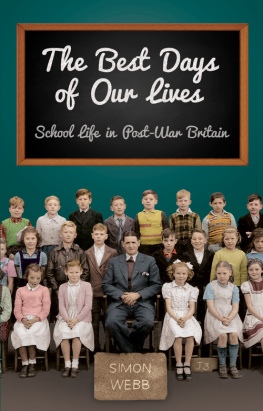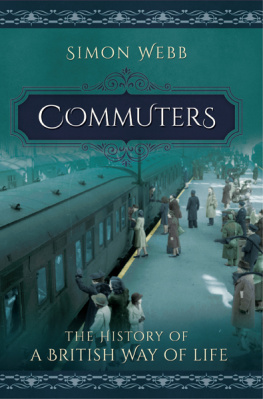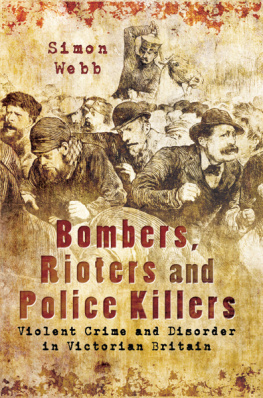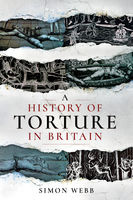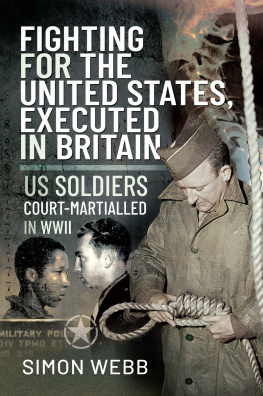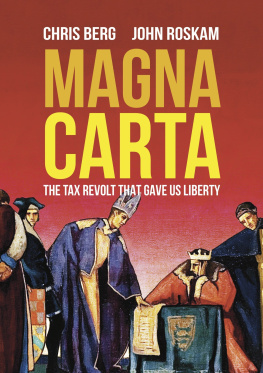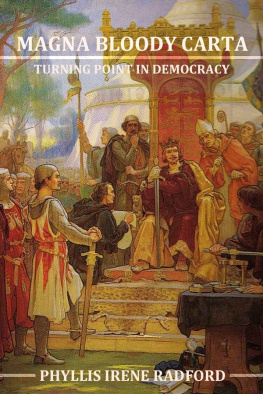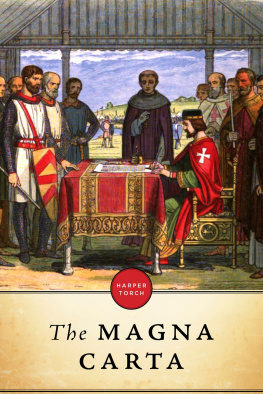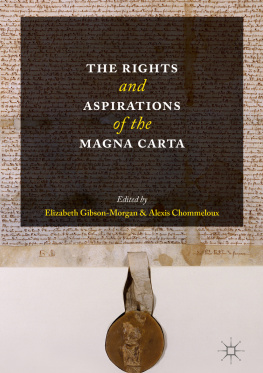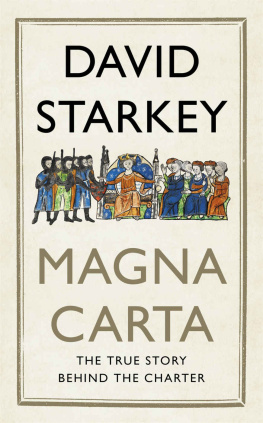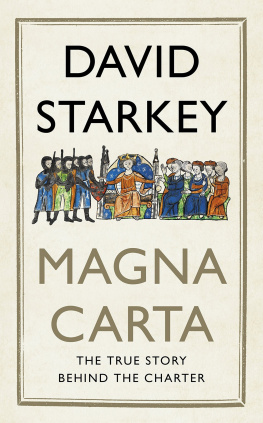Myths That Shaped Our History
Myths That Shaped Our History
From Magna Carta to the Battle of Britain
Simon Webb
First published in Great Britain in 2017 by
Pen & Sword History
an imprint of
Pen & Sword Books Ltd
47 Church Street
Barnsley
South Yorkshire
S70 2AS
Copyright Simon Webb, 2017
ISBN 978 1 47389 593 5
eISBN 978 1 47389 595 9
Mobi ISBN 978 1 47389 594 2
The right of Simon Webb to be identified as the Author of this Work has been asserted by him in accordance with the Copyright, Designs and Patents Act 1988.
A CIP catalogue record for this book is available from the British Library.
All rights reserved. No part of this book may be reproduced or transmitted in any form or by any means, electronic or mechanical including photocopying, recording or by any information storage and retrieval system, without permission from the Publisher in writing.
Pen & Sword Books Ltd incorporates the imprints of Pen & Sword Archaeology,
Atlas, Aviation, Battleground, Discovery, Family History, History, Maritime,
Military, Naval, Politics, Railways, Select, Social History, Transport, True
Crime, and Claymore Press, Frontline Books, Leo Cooper, Praetorian Press,
Remember When, Seaforth Publishing and Wharncliffe.
For a complete list of Pen & Sword titles please contact
PEN & SWORD BOOKS LIMITED
47 Church Street, (Barnsley: South Yorkshire, S70 2AS, England
E-mail:
Website: www.pen-and-sword.co.uk
List of Plates
Queen Victoria and Prince Albert as medieval monarchs.
A bad-tempered King John reluctantly signs the Magna Carta.
The White Mans Burden: bringing British values to the world.
Fundamental British values; supposedly derived from the Magna Carta.
The real Henry V; not a bit like Laurence Olivier or Kenneth Branagh.
The mud of both the Western Front and Agincourt.
Henry Vs chivalry in action; prisoners of war having their throats cut.
Francis Drake playing bowls; a towering figure in British mythology.
Commemorative plaque on the house in South London once occupied by Captain Bligh.
Captain Bligh and some of his crew are cast adrift in a small boat, following the mutiny on the Bounty.
Marshal Blcher, the true victor at Waterloo.
The Nightingale Rose; Florence Nightingales real achievement was in statistics, rather than nursing.
The suffragettes as helpless victims, rather than dangerous terrorists.
The authentic face of the suffragettes; newspaper reports of bomb attacks in 1913.
The popular image of Edwardian Britain; wealthy ladies at Ascot in 1905.
The reality of Edwardian Britain; lines of soldiers advance on strikers, as police follow in an armoured car.
Over the top; British troops march across No Mans Land towards the waiting German machine guns.
General Haig; callous butcher or brilliant strategist?
A Spitfire from the Battle of Britain, piloted by a Polish airman.
One of the Chain Home radar towers which were of crucial importance during the Battle of Britain.
Introduction: The Meaning of Myth
I n everyday usage, the word myth is now almost synonymous with misconception or even lie. When we describe something as a myth, we are in effect saying that it is untrue. We are in this way robbed of a very useful word with a specific meaning quite unconnected with falsehood or truth; which is unfortunate. Some myths are of course untrue; others though are no more than straightforward and accurate historical accounts. Perhaps it would help to understand this if we first cleared the ground a little by thinking about the nature of myth. Only then will we be able to make sense of the subject-matter of this book, which is an account of some of the great myths of British history.
Myths are stories or narratives which help us to make sense of the world and understand our place in it. Sometimes they are tales about the creation of the world. Other myths describe the origin of a nation, religion or ethnic group. In the book of Genesis, the Bible gives a mythical account of the creation of the world. The ancient Romans had a set of myths which told of the founding of their city. The Hindus and Jews both have collections of myths which describe where they come from and explain their association with a particular geographical region. A body of myths or stories which have a meaning for a particular culture in this way is sometimes called a mythos.
The Jewish mythos is to be found primarily in the first part of the Bible; known in Hebrew as the Tanakh and to Christians as the Old Testament. For the Hindus, the Mahabharata is a mythos which tells of gods and men in the early history of the Indian subcontinent. The British too have their own mythos; a collection of myths which explains who they are and how they came to hold the values and beliefs which they now have. These have never been codified into one definitive book like the Bible, but they have nevertheless given us, among other things, the British Values which successive British governments have in recent years been so keen to promote.
The mythos of the Jews tells them that they are a special people, chosen by God to bear a message to humanity. The mythos of the British is in some ways similar to this, only without the divine commission. Britain, according to this reading of history, is where the principle of the rule of law arose, as well as being the birthplace of modern democracy. These ideals were exported to the rest of the world, giving nations such as the United States of America their core values in the process. No wonder that the Magna Carta Memorial at Runnymede was erected by the American Bar Association. The granite pillar there is inscribed with the words To commemorate Magna Carta, symbol of freedom under law. For America, freedom under law is something which originated in Britain. This gives the British their most popular and enduring mythic narrative, although there are others which are almost as powerful.
Carl Jung popularized the idea of mythic archetypes, recurring figures which crop up in myth systems around the world, such as the hero, the trickster and the wise old woman. He wrote also of archetypal motifs such as the Deluge. Universal floods are to be found not only in the Bible, but also in legends of the Sumerians. Ancient American cultures, such as the Maya and Aztecs, also feature this motif of the worldwide deluge which destroys all humanity other than a tiny handful of survivors. There are also mythic characters and situations which are not universal, but are rather limited to one particular culture. In the Bible, Israels apostasy is a recurring theme, as is the idea of the prophet without honour in his own land. Jesus Christ is of course the most commonly-known example of this figure from Hebrew myth. The British have their own special set of mythic images and we see these cropping up over and over again in the nations history.
That the rule of law, habeus corpus and so on have something to do with the Magna Carta and are Britains most precious gift to the world, is one myth beloved by the British. Others include the myth that Britain does best when outnumbered and with its back to the wall. This David and Goliath image, with Britain battling, and ultimately triumphing, in the face of overwhelming odds is tremendously popular. We see it in the Battle of Agincourt and the defeat of the Spanish Armada. More recent examples of this particular myth come from the Second World War. The evacuation of Dunkirk, the Battle of Britain and the Blitz all show Britain standing alone against a mighty foe and, in the end, coming out on top.


